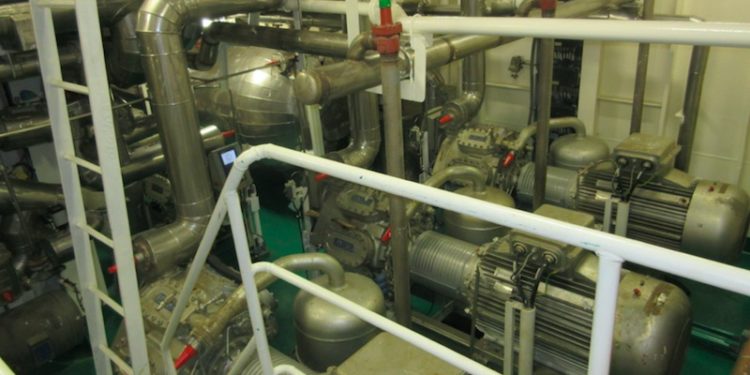Russian Fishing Company (RFC) has placed orders with Johnson Controls CO2 freezing plants from Johnson Controls.
‘The first trawler in the series is scheduled to be built at Tersan Shipyard in Turkey with an expected delivery date in June 2020, and the other six trawlers are ordered from the Admiralty Shipyard in Saint Petersburg,’ said John Bilde, fishing sector sales manager at Johnson Controls.
He said that he company’s breakthrough on the Russian market was made possible because of the benefits of CO2 freezing plants.
‘CO2 reduces operational costs compared to other refrigerants like ammonia or R22. At the same time, the CO2 freezing plant enables faster defrosting at a lower temperature, which increases the production capacity by 25% and improves the quality of the fish produced in the freezing plant,’ he said.
In addition to increased production capacity and reduced costs, this enables shipowners to phase out R22 refrigerant. This is a requirement for the global fishing fleet in 2020 according to the Montreal Protocol.
‘Many operators have yet to replace R22 units with green refrigerants even though ammonia and CO2 future-proof the fishing vessel for political regulations and ensure long-term costs-savings,’ John Bilde said.
In 2002, Johnson Controls was the first company in the world to design and launch CO2 freezing plants, and since then the company has supplied the global fishing fleet with all kinds of refrigeration systems.
‘We offer a cascade system with ammonia at the high-pressure level and CO2 at the low-pressure level. This way, shipowners benefit from an evaporation temperature of -50°C along with excess pressure in the plant,’ he said.
‘The low evaporation temperature together with the physical properties of CO2 enables a higher freezing capacity, which is necessary to produce and preserve tonnes of fish.’
Johnson Controls is participating at Nor-Fishing 2018 and can be found on Stand 130 in Hall T









